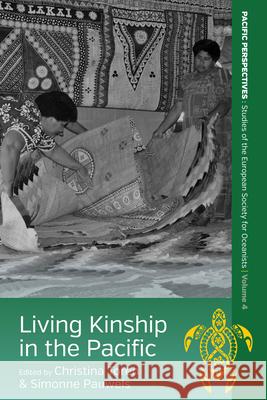Living Kinship in the Pacific » książka
Living Kinship in the Pacific
ISBN-13: 9781782385776 / Angielski / Twarda / 2015 / 300 str.
Living Kinship in the Pacific
ISBN-13: 9781782385776 / Angielski / Twarda / 2015 / 300 str.
(netto: 484,12 VAT: 5%)
Najniższa cena z 30 dni: 498,70
ok. 22 dni roboczych.
Darmowa dostawa!
"Studying kinship is like vitamins for anthropologists: it's always beneficial and we don't get enough. This book provides strong and useful accounts of contemporary understandings of kinship in the Pacific." - Matt Tomlinson, Australian National University "A timely and worthwhile book. The introduction is compelling and contemporary, and the chapters in the main are very well written, clear, interesting, and suggestive... the] enlightening discussion of ritual and learning in childhood, and what that implies for how people come to 'know' about kin... and about the significance and meaning of kinship] practices, is excellent." - James Leach, Researcher CNRS, CREDO Unaisi Nabobo-Baba observed that for the various peoples of the Pacific, kinship is generally understood as "knowledge that counts." It is with this observation that this volume begins, and it continues with a straightforward objective to provide case studies of Pacific kinship. In doing so, contributors share an understanding of kinship as a lived and living dimension of contemporary human lives, in an area where deep historical links provide for close and useful comparison. The ethnographic focus is on transformation and continuity over time in Fiji, Tonga, and Samoa with the addition of three instructive cases from Tokelau, Papua New Guinea, and Taiwan. The book ends with an account of how kinship is constituted in day-to-day ritual and ritualized behavior. Christina Toren is Professor of Anthropology and founding Director of the Centre for Pacific Studies at the University of St Andrews. Her works include Mind, Materiality and History (1999) and The Challenge of Epistemology (co-edited with Joao de Pina-Cabral, 2012). Simonne Pauwels is a Researcher at CNRS and the adjunct Director of CREDO. Before working in Fiji, she conducted research in Eastern Indonesia for many years and, besides a number of articles, has written Metanleru, un voilier predateur: Renommee et fertilite dans l'ile de Selaru (2009) and D'un nom a l'autre en Asie du Sud-Est, Approches ethnologiques (co-edited with Josiane Massard-Vincent, 1999).
"Studying kinship is like vitamins for anthropologists: its always beneficial and we dont get enough. This book provides strong and useful accounts of contemporary understandings of kinship in the Pacific." · Matt Tomlinson, Australian National University
"A timely and worthwhile book. The introduction is compelling and contemporary, and the chapters in the main are very well written, clear, interesting, and suggestive... [the] enlightening discussion of ritual and learning in childhood, and what that implies for how people come to know about kin... and about the significance and meaning of [kinship] practices, is excellent." · James Leach, Researcher CNRS, CREDO
Unaisi Nabobo-Baba observed that for the various peoples of the Pacific, kinship is generally understood as "knowledge that counts." It is with this observation that this volume begins, and it continues with a straightforward objective to provide case studies of Pacific kinship. In doing so, contributors share an understanding of kinship as a lived and living dimension of contemporary human lives, in an area where deep historical links provide for close and useful comparison. The ethnographic focus is on transformation and continuity over time in Fiji, Tonga, and Samoa with the addition of three instructive cases from Tokelau, Papua New Guinea, and Taiwan. The book ends with an account of how kinship is constituted in day-to-day ritual and ritualized behavior.
Christina Toren is Professor of Anthropology and founding Director of the Centre for Pacific Studies at the University of St Andrews. Her works include Mind, Materiality and History (1999) and The Challenge of Epistemology (co-edited with João de Pina-Cabral, 2012).
Simonne Pauwels is a Researcher at CNRS and the adjunct Director of CREDO. Before working in Fiji, she conducted research in Eastern Indonesia for many years and, besides a number of articles, has written Metanleru, un voilier prédateur: Renommée et fertilité dans lîle de Selaru (2009) and Dun nom à lautre en Asie du Sud-Est, Approches ethnologiques (co-edited with Josiane Massard-Vincent, 1999).











